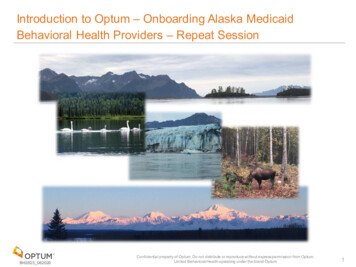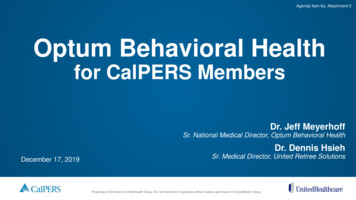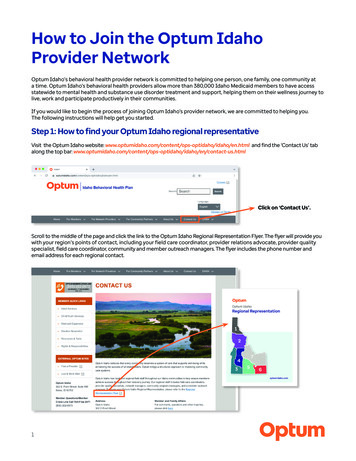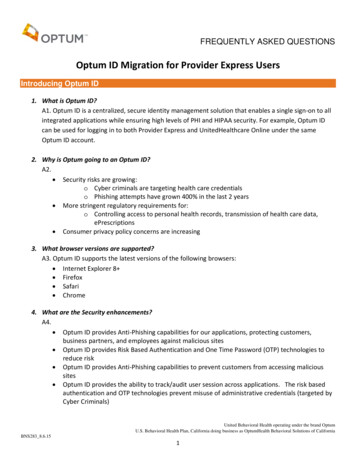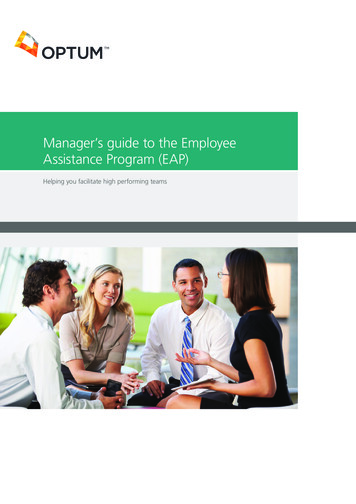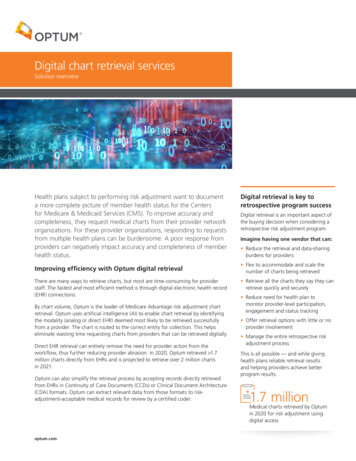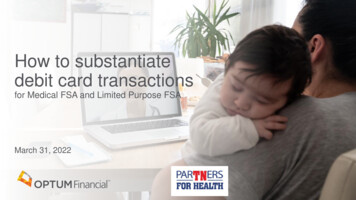
Transcription
Optum Behavioral Health ServicesA whole-person approach to improve outcomesfor Medicaid agencies and their members
Serving the needs of the whole personAt Optum , we’re keenly aware of the challenges confronting Medicaid today: The need toimprove both quality and cost of care, improve the care experience and meet new demands suchas the Affordable Care Act. Our full range of behavioral health solutions are designed to help youmeet these CMS Triple Aim goals and address issues unique to your population.2
As the country’s largest managed behavioral health organization, our foundational approach focuses onindividual needs. We do this by creating person-centered systems of care that honor and respect the voiceof each individual, taking a whole-person approach to improve both physical and mental/psychologicalhealth. And because a stable living environment is an essential facet of personal well-being, we includehousing and work status in our empowerment strategies.The key to whole-person-centered health care is to meet individuals where they are and createopportunities to help them access the knowledge, tools and services they need to achieve and maintaintheir well-being. We emphasize engagement, bringing individuals together with their families, health careproviders and community support. It’s this approach that enables us to help Medicaid agencies ensure thebest care possible while lowering costs, expanding access, reducing administrative burdens, empoweringindividuals and improving care quality across the system.HopeWell-beingWellnessEngagementon- centeredEmpowermentrsPenW hole persoRecoveryResiliencyPersonal goals3
Care integration improves behavioral health at lower costAt Optum, we’re committed to partnering with stateOur program supports a full range of integrated careand local communities to coordinate treatment andmanagement and services delivery, including:resources for people with multiple physical and behavioral Member-focused, integrated care management tocoordinate serviceshealth conditions. An integrated care model serves both A single data system to manage all physical anddimensions of individual health to reduce inefficienciesbehavioral health dataand improve outcomes. An example of this success can be Whole-health assessments to initiate early treatment forfound in Tennessee, where Optum and UnitedHealthcare depression, substance use and physical healthCommunity Plan have partnered since 2007 to develop a 24/7 integrated call center for routine, urgent andmember-centric, interdisciplinary approach to care.emergent issues, including crisis interventionServing approximately 600,000 TennCare members, our Interdisciplinary clinical rounds to address complex cases,program uses evidence-based practices and data-drivencoordinate care and share best practicesanalyses to identify and coordinate services based onindividual need. It also works with peer- and family-runThe successful initiatives implemented by TennCare are noworganizations in the community to support recovery,being replicated in other markets, bringing more effectiveresiliency and whole-person wellness.and efficient integrated care to other medically complexMedicaid populations across the country.Reduction in behavioral inpatient care16% decrease in inpatient1utilization statewide3.6Min savings18.3%decrease in psychiatricreadmissions2 1.0Min savings2Improvement in HEDIS rates342% Improvement in follow-up afterhospitalization within 7 days32% Improvement in follow-up afterhospitalization within 30 days1. Results from Optum analysis of inpatient admission reports from TennCare for FY2011 to FY2012. Cost savings is based on a daily average TennCare unit cost of 525. Resultsinclude reductions in psychiatric readmission rates in West Tennessee during the same period.2. Results from Optum analysis of state quarterly psychiatric readmission reports for the West Tennessee region, from FY2011 to FY2012 (psychiatric readmissions statewidedecreased overall). Cost savings is based on a daily average TennCare unit cost of 525.3. Based on Optum comparison of HEDIS rates for the West Tennessee region from FY2009 to FY2012 (three-year period).4
Enhancing jail diversion initiativeswith effective crisis programsThe U.S. criminal justice system involves a disproportionatenumber of people with behavioral health conditions,significantly straining state budgets. But, as we’ve found in SaltLake County, Utah, treating people with mental health andsubstance use disorders — instead of sending them to jail —can result in improved health and preserved tax dollars.Optum has worked with Salt Lake County to develop andimplement the following services for individuals in a mentalhealth crisis facing incarceration:Crisis Services Mobile Crisis Outreach Team (MCOT) — On-site, rapid-Since assuming the management of Washington’s Pierceresponse crisis interventionCounty Regional Support Network (RSN) in 2009, Optum Receiving Center — A safe, supportive space wherenonviolent offenders can manage their crisis Assertive Community Treatment (ACT) — An innovative,has worked with individuals, providers, hospital systemsand other local constituents and stakeholders to transformthe region’s crisis system into a community-based, recovery-comprehensive approach for those who need it most,oriented response system integrating peer supports and aresulting in a 66% drop in inpatient care costs and 43%no-force approach to care.decline in overall health care spend since implementation The Recovery Response Center provides a welcomingIn combination with Salt Lake County’s Alternatives toenvironment where individuals can find solutions in timesIncarceration programs — also managed by Optum — theseof crisis, avoiding automatic hospitalization or involuntaryservices have led to improved care coordination and moredetention.efficient use of limited resources. The Recovery Response Line is a non-crisis phone serviceLaw-enforcement referred cases from July 1,2014, to June 30, 2015run by and for individuals who have been diagnosed witha mental illness, offering support before a crisis arises.As a result, outcomes have been improved, resources areused efficiently, and those with mental health conditions1,31748MCOTReceiving Center“If even half of these referrals resulted in the preventionof booking and jailing, these two crisis services alone[MCOT and the Receiving Center] would save thecounty over 1.3 million.4”— Sandy Forquer, Optum senior vice presidentof state government behavioral programshave been supported in their recovery efforts.31.9%32.1%22.5%reducedhospitalizationsover five yearsreduced30-day admissionsbelow thestate average forinpatient days perthousand54. Savings estimate based on Salt Lake County’s conservative estimated criminal justice costs of 2,000 per arrested individual, which was informed by: Cowell AJ, Aldridge A,Broner N, Hinde JM. A Cost Analysis of the Bexar County, Jail Diversion Program, May 2008.5. Optum analysis of redesigned Pierce County regional support network, Dolesal G and Motz F. 5/1/2015. Reduction in hospitalizations and reduction in 30-day readmissionrate percentages are calculated as the average reduction over the five-year period compared to the prior benchmark year. Bed days per 1,000 is calculated as bed daysdivided by total covered county population.5
Peer support services: Fostering recoverySupporting successful transitionsPeer support is an integral part of our recovery-orientedOptum peer coach and support services can help individualsapproach to behavioral health. A peer is an individual whocoping with serious mental illness and/or substance usehas had several years in recovery. Peers are trained to helpdisorders transition from hospitalization to community life,people currently dealing with a mental health or substancebuild resiliency and reduce their need for readmission.use disorder by providing support, encouragement and linksWe have developed and tested a peer support program into community resources. Receiving help from people who’veNew York and Wisconsin to assist covered members as they“been there” can reduce isolation and foster hope.make this transition from the hospital to the community. TheOptum has facilitated the incorporation of peer supportresults indicate that these services help improve engagementservices into public mental health systems in more than 20and activation of covered members.states, resulting in better adherence to follow-up treatment,fewer unnecessary re-hospitalizations and significant costsavings for local governments.Six months pre- and post-treatment, enrolledprogram members show:New YorkWisconsinSignificant decreases in the use of inpatient services47.9% decrease(from 92.6% to 48.2%)38.6% decrease(from 71.5% to 43.9%)Significant decreases in the number of inpatient days62.5% decrease(from 11.2 days to 4.2)29.7% decrease(from 6.4 days to 4.5)Significant decreases in overall behavioral health costs per person47.1% decrease(from 9,999 to 5,292)24.3% decrease(from 7,555 to 5,716)66. Results within six months after enrollment in peer support programs in Wisconsin and New York, compared to six months prior to enrollment; among asubsample of participants (Wisconsin: 130; New York: 54) with continuous eligibility for six months pre- and post-referral and at least one behavioral healthclaim during that period; referred to the program between 09/01/2009 and 07/31/2012 (New York) and between 12/01/2009 and 12/31/2011 (Wisconsin).6
Time-tested solutions for behavioral healthOptum is committed to helping Medicaid agencies meet the objectives set forth in the CMSTriple Aim: reducing avoidable health costs, improving the customer experience and achievingimproved health outcomes. With a focus on whole-person health, we integrate care to helpminimize barriers between medical, behavioral and social services. And, through the use ofinnovative services, such as peer support and crisis intervention, we empower individuals topursue and achieve long-term recovery in the ways that work best for them.Optum has been putting these practices into action for 10 years, serving a diverse set ofcommunities in 40 states. To discover how Optum Behavioral Health Solutions can help youragency reduce costs, improve the care experience and improve health outcomes, visit optum.com/BH4Medicaid or contact us at 1-866-223-4603, email outcomes@optum.com.7
optum.com11000 Optum Circle, Eden Prairie, MN 55344Optum and the Optum logo are registered trademarks of Optum, Inc. All other brand or product names are trademarksor registered marks of their respective owner. Because we are continuously improving our products and services, Optumreserves the right to change specifications without prior notice. Optum is an equal opportunity employer.Confidential property of Optum. Do not distribute or reproduce without express permission from Optum. 2016 Optum, Inc. All rights reserved. WF252066
Optum has been putting these practices into action for 10 years, serving a diverse set of communities in 40 states. To discover how Optum Behavioral Health Solutions can help your agency reduce costs, improve the care experience and improve health outcomes, visit optum. com/BH4Medicaid or contact us at 1-866-223-4603, email outcomes@optum.com.
